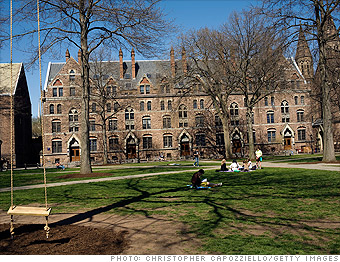
Residents with advanced degrees: 15.1% of population
Residents with some college education: 59.3%
The home of Yale University, Connecticut also has a handful of less world-renowned but still very strong schools like the University of Connecticut, Quinnipiac University, and the University of Hartford.
Connecticut also has a healthy backbone of community colleges. "There are a lot of programs that are customized at the community college level that help educate the future workforce for the companies we have in the state," says Alissa DeJonge, director of research at the Connecticut Economic Resource Center.
Larger research universities, like Yale and University of Connecticut, tend to launch entrepreneurial spin-off companies, DeJonge noted. Biomedical companies that began at Yale, for example, include Axerion Therapeutics, which develops treatments for neurological diseases and injuries, and drug researcher New Haven Pharmaceuticals.
Connecticut also draws educated migrants from within the U.S. The typical new arrival has 14.34 years of education, according to Kauffman's research -- well ahead of the U.S. average of 13.1 years.
NEXT: Vermont
